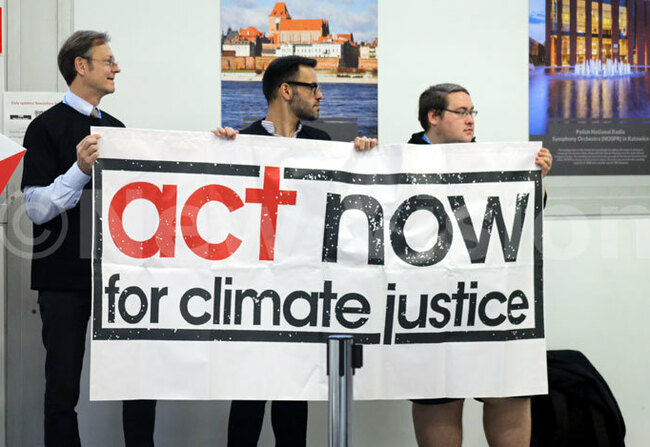Uganda outlines expectations from UN Climate summit
Up to 18 industrialized countries committed to mobilize 100 billion dollars each year by 2020 to finance climate mitigation and adaptation in developing countries
CLIMATE-As world leaders meet in the chilly Polish city of Katowice for the UN conference on climate Change, the Ugandan delegation hopes these talks will be different from previous international negotiations and ensure that all big emission emitters are compelled to pay for the damages that developing countries are suffering as a result of climate change.
"We believe that the adoption of the Paris guidelines which is expected to be done here will be robust enough to ensure that all big polluters can pay for the damages developing countries are suffering," says Chebet Maikut, commissioner at the Climate Change Department, Ministry of Water and Environment and the United Nations Framework Convention on Climate Change (UNFCCC) focal person for Uganda.
The funds, Chebet cites, include the two billion USD that US President Donald Trump cancelled last year.
This money was part of the three billion dollars promised by former US President Barack Obama to the Green Climate Fund (GCF).
Up to 18 industrialized countries including Australia, France, Germany, UK and USA committed to mobilize 100 billion dollars each year by 2020 to finance climate mitigation and adaptation in developing countries.
Speaking in an interview with New Vision at the conference in Poland, Chebet insisted that Uganda expects developed countries to honour their pledges at the end of this conference of contributing financial resources to battle climate change.
"The commitment they made some years back has to be made true and this is what we would like to push for, notes Chebet, further stressing that, this should be, " embedded in the Paris rule book," expected to be adopted at the conference this weekend.
 Protestors at UN conference on climate change in Poland.(Photo by Fredrick Mugira)
Protestors at UN conference on climate change in Poland.(Photo by Fredrick Mugira)
China is the world's biggest polluter followed by USA and India according to statistics from the Global Carbon project, a global carbon research project.
Statistics from the Global carbon Project indicate that Uganda, the 126th world's polluter emitted 5.8 million tons of carbon dioxide in 2017 while China, the world's leading polluter emitted 9839 million tons of carbon dioxide in the same year.
Disasters triggered by weather and climate change related hazards cost the global economy 320 million USD in losses in 2017 according to the World Bank. Most victims were developing countries like Uganda.
Now, Chebet stresses that this conference must put in place appropriate measures to limit the warming up of the planet in light of the Intergovernmental Panel on Climate Change special report.
The report emphasis that the world is only left with 12 years to take action on climate change short of this, consequences would be dare to millions of people particularly those in poor developing countries Uganda inclusive.
Uganda's delegation to this conference is headed by Kitutu Kimono Mary Goretti, minister of state for environment.
Kitutu told New Vision that as Uganda looks for funds elsewhere to battle climate change; it must commit more national resources to protection of environment.
"The budget of environment which now stands at three per cent of the national budget should at least be increased to 10 (per cent), then we can know that we are at least walking the talk," she said.
Earlier, while speaking at a side event hosted by the government of New Zealand that explored the role of agriculture sector in achieving the aims of the Paris agreement, Minister Kitutu said Uganda's emission stand at 0.01 per cent of the world's emission.
She revealed that most of Uganda's agriculture emission comes from, "enteric fermentation, animal wastes, growing of rice in wetlands, burning in savannah areas, burning of agriculture residues," but stressed that efforts to reduce emissions in agriculture sector, "have been prioritized."
Global carbon dioxide emissions increased in 2017, after a three-year period of stabilization which is looked at as threat to achieving ambition of the Paris agreement of limiting warming to 1.5 degree Celsius or well below two degrees.